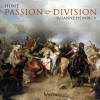Texte paru dans: / Appeared in:

Fanfare Magazine 33:6 (07-08/2010)
Pour
s'abonner / Subscription information
Les abonnés à Fanfare Magazine ont accès aux archives du
magazine sur internet.
Subscribers to Fanfare Magazine have access to the archives of the magazine
on the net.
Hyperion
CDA67811

Code-barres / Barcode:
0034571178110
Consultez toutes les évaluations
recensées pour ce cd ~~~~ Reach all the evaluations located for this CD
Next to nothing is known to date of Captain Tobias Hume, as he styled himself. Circumstantial evidence leads us to believe he was born as early as 1575, or as late as 1580, and we know he died in 1645. He was a soldier by profession, as well as a composer. We have no knowledge of his military training, though Hume states in the prefaces to his two collections of music largely for viol—The First Part of Ayres (1605) and Captain Humes Poeticall Musicke (1607)—that war had been his whole life, and music, just a hobby. He would seem to have been self-taught as a musician, as he never mentions his credentials. His works do not appear to have been very popular, judging from the lack of further publications and a general disinterest in copying selections of his music into private manuscripts for personal enjoyment, a common practice during the period.
Yet in modern times Hume has developed a following, because of the viol da gamba revival, the idiomatic nature of his writing, and the simple, direct music itself. Susanne Heinrich writes eloquently on behalf of Hume’s compositions, and I completely agree with her appreciation of these pieces drawn from his first book, including the lighter efforts, such as A Jigge, Touch Me lightly, Tinckeldum, Twinckeldum, The Duke of Holstones Almayne, and Life, and the more dolorous ones that include I am Melancholy, Deth, and the eloquent, Scots-sounding Loves Farewell. The last is plucked rather than bowed, one of a few numbers treated in this fashion, and with a richly expressive line underscored by Heinrich. In general, she’s more interested in phrasing than following exact rhythms, which sets her apart from the flexible but still bar-bound Paolo Pandolfo/Labyrinto (Glossa C80402), and the more strict Les Voix Humaines (Naxos 8.554126/7). Her approach in this respect is similar to that of Jordi Savall, yielding dividends in emotional communicativeness in Loves Pastime—somewhere between an exotic musette tune and an unmeasured prelude in style—and the lachrymose Captain Humes Pavan. Where Labyrinto takes The Spirit of Gambo at an allegro pace with an almost military jauntiness, and Les Voix Humaines treats it as a sepulchral dirge, Heinrich favors a slow but fluid moderato that emphasizes the piece’s somberness while leaving her free to employ all the resources of her instrument to advantage. Her technique is of course on display at all times, and while little of this music offers a challenge based on speed or complexity, for style, tonal beauty, and expressive phrasing, her accomplishment here would be hard to beat.
The sound is intimate and well equalized across the viol’s range, with just enough resonance to enhance it without drawing attention to the room. Heinrich’s own liner notes are informative, if partisan. (I understand the desire to stick up for an outsider such as Hume, but his offering of multiple copies of Captain Humes Poeticall Musicke with different epistolary dedications to milk gifts from various members of the nobility—switching out little but the names—smacks of a confidence trickery that even the highhanded Elizabethans acknowledged as distasteful.) In short, a delightful release, and recommended with full honors.
Cliquez l'un ou l'autre
bouton pour découvrir bien d'autres critiques de CD
Click either button for many other reviews


